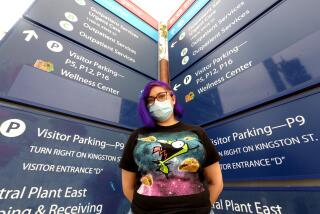Trauma Center Alert
- Share via
Drive carefully in the San Gabriel Valley, the East San Fernando Valley and around Los Angeles International Airport. If you have a serious car accident in one of those places, you might have trouble getting to a trauma center.
Most people expect that when they are in an accident, paramedics will arrive and whisk them to a hospital where their injuries will be treated promptly and professionally. This is one of the things most Southern Californians take for granted. But as Times writer Claire Spiegel reported this week, the trauma system in Los Angeles County has been strained to the point that such assumptions are unwarranted.
The number of specially designated trauma care centers in Los Angeles County has fallen to 13 from an original 23 because many hospitals have found them simply too expensive to operate. Unlike emergency rooms, trauma centers have surgeons, radiologists and anesthesiologists on the premises at all times so patients with serious injuries can undergo emergency surgery immediately. When the trauma center network opened in 1983, it was expected that the death rate from car accidents or violence would be reduced.
Funding is a problem for regular emergency rooms as well as trauma centers. A growing number of the patients treated in Los Angeles hospitals are uninsured or indigent. For many of them, the emergency room is the only place they can hope to see a doctor.
The long-term solution to providing adequate emergency care in Los Angeles is a reorganization of the health care system. But in the short term, the only means of insuring that hospitals remain open to all comers--trauma or non-emergency, rich or poor--is public spending.
Money must be found. There is hope that some of the tobacco tax revenues culled by Proposition 99 will be directed to the trauma network when allocation decisions are made this month. Next year’s state budget for the health care system must also be expanded.
Trauma care is good medicine. It may be expensive medicine. But it is medicine Los Angeles cannot afford to lose.
More to Read
Sign up for Essential California
The most important California stories and recommendations in your inbox every morning.
You may occasionally receive promotional content from the Los Angeles Times.










